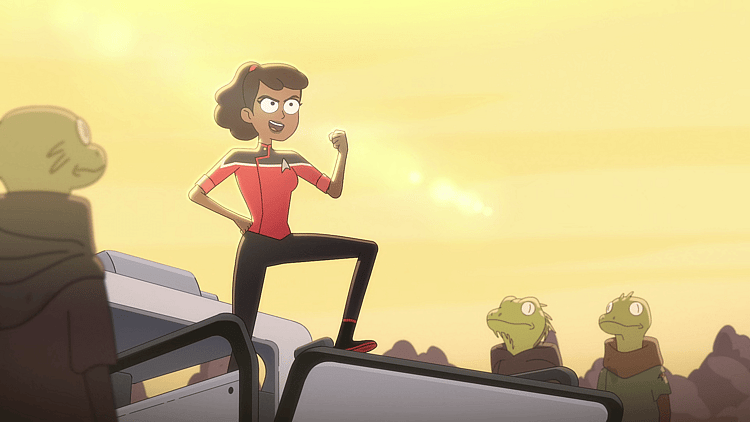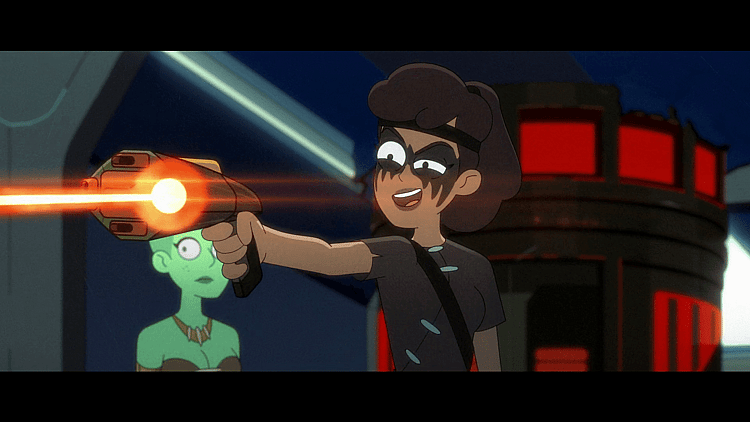Review: Star Trek: Lower Decks Episode 9 – Crisis Point – All Style, No Substance

This week, Star Trek: Lower Decks goes Hollywood, as the crew of the Cerritos find themselves in an action-packed parody of the franchises’ cinematic outings.
Crisis Point opens on a triumphant Mariner admiring the results of a successful revolution she has just led of an alien lizard people, who were being raised solely for food, against their society’s leader.
Much to her chagrin, Mariner’s celebration is soon interrupted by the appearance of Captain Freeman, who proceeds to admonish the rogue ensign for her clear and blatant violation of the Prime Directive. Tired of Mariner’s constant insubordination, an angry and frustrated Freeman attempts to address Mariner’s behavior by ordering her to attend mandatory therapy sessions.

After her first reluctant therapy session with the ship’s counselor, Dr. Migleemo, Mariner retreats to the Holodeck to wallow in her situation in the company of Tendi and Rutherford, who are engaged in target practice with a holographic Leonadro Da Vinci.
The three are soon interrupted by Boimler, who informs them that he needs to use the Holodeck in order to prepare for an upcoming interview with Captain Freeman. As Boimler initiates a program he created that perfectly emulates the entire crew of the Cerritos (thanks to his unpermitted use of their personal logs), Mariner leaps to reprogram the simulation to her own personal alternative to therapy, much to the surprise of her friends.

As a result of Mariner’s last-minute manipulation, the Lower Decks crew find themselves in a ‘movie’-styled simulation in which Mariner, Rutherford, Tendi, and a stand-in for Boimler (who instead attempts to complete his preparation rather than engage in the story) raid the Cerritos as a band of violent space pirates.
Unfortunately, this merry band is soon broken up, as Rutherford becomes more obsessed with positively interacting with the simulation of his boss, Lt. Cmdr Billups, and Tendi becomes disturbed by the perverse enjoyment Mariner appears to be taking from realistically murdering her crew members.
Left by herself, Mariner is soon confronted by a simulated version of herself and, after a lengthy duel, is both defeated and forced to come to terms with her own insecurities, just as the Holodeck ends the simulation.

Filled with a new sense of pride, Mariner returns to duty with a less-antagonistic attitude, much to the surprise of Freeman. Meanwhile, Boimler, who returned to the cinematic simulation in order to complete his interview prep, is shocked to discover Freeman and Mariner’s mother-daughter relationship, which had been expertly kept secret from the crew of the Cerritos.
Soon thereafter, Freeman meets Boimler for his interview, only for the young ensign to babble incoherently about Mariner before leaving the room, to which confused Freeman ironically notes that Boimler appears to have failed to prepare for the interview.

From the outset of Mariner’s simulation, it’s clear that most of this episode is intended to be a parody of J.J. Abrams’ high-budget cinematic Star Trek trilogy. Aside from its general presentation as a movie (complete with matte black letterbox bars), the Holodeck simulation features gratuitous shots of the Cerritos’ exterior, gigantic environmental set pieces, and various moments of extended combat.
It’s a clever nod, though one wonders if this parody had the intended effect of poking fun at Abrams that the writers intended, as this thematic deviation ultimately presents one of the more interesting ‘stories’ seen in Lower Decks thus far.

Like Veritas last week, the quality of animation and direction seen in Crisis Point deserves a special mention. It may be a byproduct of the ‘Abrams Parody’ angle, but nearly every scene in Mariner’s simulation is both beautifully animated and expertly choreographed.
In particular, the Cerritos’ crash landing and Mariner’s mirror match stand as not only as a highlight the series’ production quality, but also its sadly missed potential to deliver genuinely exciting story beats.

However, also similar to Veritas before it, Crisis Point is betrayed by Lower Decks’ signature writing style. While the comedy continues to fail to land (mostly due to the easily predictable nature of most of the series’ jokes mentioned in prior reviews), the episode fails to achieve its goal of making Mariner into a more likeable character.
Though the aim of the episode was clearly to hold a mirror up to Mariner’s actions and lead her to have a change of heart, the appearance of Mirror Mariner only serves to reinforce just how awful the real version of Mariner truly is.
While it’s fantastic that she’s gone through an apparent moment of character development, if this new outlook on life fails to remain in future episodes, audiences will undoubtedly be wishing that Boimler’s simulated version of Mariner would have been the one to return to active duty.

The Verdict
Lower Decks’ first flirtation with the silver screen is a divisive one. On one hand, the episode looks absolutely gorgeous, with well-animated fights and dazzling effects, but on the other, it continues the series’ trend of introducing lackluster plots that fail to drive home any sort of meaningful point. There’s an indication that the episode’s cliffhanger, as well as Mariner’s supposed change of attitude, could lead to a more overarching sense of continuity and development than seen before, which would be highly beneficial for the series’ writing, but a commitment to that direction remains to be seen.
With only one episode left in its first season, there’s a small sliver of hope that Lower Decks may see a future bump in quality, but at this point, one would be advised against holding their breath.
